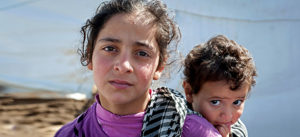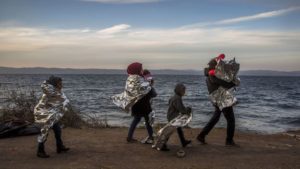Half of Syria’s population now uprooted – UNHCR
After six years of brutal conflict, the number of refugees who have fled Syria for neighbouring countries has topped five million – almost a quarter of the nation’s entire population.
According to the UNHCR, half of Syria’s population of 22 million has been uprooted with another 6.3 million still inside the country but forced from their homes.
The unwelcome milestone of five million does not include 1.2 million seeking safety in Europe and further afield.
A surge in violence in Aleppo, as government forces backed by Russian airstrikes retook Syria’s second city at the end of 2016, resulted in 47,000 people fleeing to neighbouring Turkey, the UNHCR said.
 Camps for internally displaced people close to the Turkish border also hold those who have fled the fighting in northern Syria.
Camps for internally displaced people close to the Turkish border also hold those who have fled the fighting in northern Syria.
The latest arrivals into Turkey have pushed the number of Syrians who have fled the country for neighbouring states to over five million. Four years ago that figure stood at one million.
The five million figure includes refugees who have been resettled in Europe, but the UN high commissioner for refugees urged Europeans to do more to help share a burden that is still largely falling on countries bordering Syria, such as Turkey, Lebanon and Jordan.
Turkey alone has nearly three million Syrians, the UNHCR said.
In Jordan, 657,000 Syrian refugees are registered with the UN, but the government there says the true figure is 1.3 million.
Tens of thousands of Syrians live in two large camps, Zaatari and Azraq, but the majority live in homes and flats, able to access the job market but competing for scarce employment.
The situation is more confused in Lebanon, where the government has refused to allow the establishment of formal refugee camps for Syrians.
Yet Palestinians have been living in camps for more than 50 years.
 The UN says about one million Syrians are in the country, though the government says the figure is higher, with many living in dismal conditions in informal camps.
The UN says about one million Syrians are in the country, though the government says the figure is higher, with many living in dismal conditions in informal camps.
Syrians are among thousands of people tuck on Greece’s Aegean islands as a result of an EU-Turkish agreement that curbed the influx of migrants and refugees to the EU.
Elsewhere in Europe, France and Germany are both gearing up for crucial elections, with far-right candidates seeking to exploit public fears about immigration.
A UNHCR spokesman, Babar Baloch, told media this week: “This is not the time to shun Syrian refugees. Our hope is that humanity will not be put on a ballot”.
“Europe went through this during the Second World War and there were many countries which supported Europe. Syria is currently going through this trauma and it now needs the world’s support. We should not be turning our backs on people in need,” Mr Baloch said.
“The solution to the crisis in Syria is political but, in terms of support, it is humanity that is needed. We are asking other countries to come forward and help those countries neighbouring Syria that are hosting large numbers of Syrian refugees to share responsibility for resettlement and humanitarian admissions. Those desperate refugees are in need of resettlement,” he said.
UN High Commissioner for Refugees Filippo Grandi urged nations to honour existing promises of help and to do more to help.
“To meet this challenge, we not only need additional places but also need to accelerate the implementation of existing pledges,” he said.
Last year, a pledge conference in Geneva agreed to resettle 10 per cent, or 500,000, of all Syrian refugees by 2018. So far, only 250,000 places have been made available.
“These generous pledges are a welcome and important symbol of solidarity and responsibility sharing by the international community. If we are to achieve our goal, we now need to accelerate these efforts in 2017 and beyond,” Grandi said.
Laurie Nowell
AMES Australia Senior Journalist












